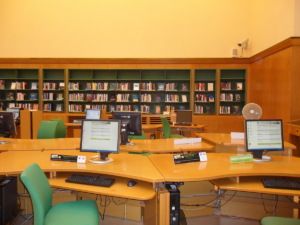General
At least 46 libraries caught up in NemID fraud
This article is more than 5 years old.
Two brothers with previous terror connections stand at the heart of the cases

The Library Act dictates that Danish libraries must provide access to computers (photo: Mourad Ben Abdallah)
In the last five years, libraries across the country have been involved in cases of fraud, with perpetrators using keylogging monitoring equipment to record the key strokes of computer users.
This information can be used to intercept CPR numbers and confidential details used to access NemID. As a result, there have been cases of perpetrators accessing bank accounts and taking out loans in the names of the victims.
Not taken seriously
The information has been brought to light by DR. Documents they have seen reveal that from 2015 to 2018 keyloggers were found in 23 libraries, with a further 23 libraries the site of current fraud investigations.
“It is a surprisingly large number, and it has been going on for many years. There has clearly been a lack of recognition of the problem in the municipalities, and this is a very big failure,” Jan Pries-Heje told DR, a professor of computer science at Roskilde University.
According to the Library Act, it is mandatory for libraries to make computers available so that those without access at home are able to make us of online services.
“When you force people to use NemID, you also have to make sure that they can do it safely,” demands Frederik Waage from the University of Southern Denmark.
Terrorists turned fraudsters
On Sunday DR also revealed the role of two Danish-Somali brothers in the library fraud cases. In 2012 the two brothers were arrested and charged with terrorist training and planning after the elder brother returned from an al-Shabaab training camp in Somalia.
A High Court in 2014 ruled that the brothers were “two young people with a radicalized relationship to Islam”, and that the older brother “intended to commit terrorist acts”.
They were acquitted of financing terror but sentenced to two years in prison for attempted terrorist training. Having already spent two years behind bars they were immediately released.
Fraud cases stack up
For a period of at least six months between 2016 and 2017, these brothers were at the heart of the keylogging operations – installing the devices on public computers in at least eleven libraries across the country.
Last year, the brothers were sentenced to 3.5 years and 5 years imprisonment respectively and convicted of defrauding, or attempting to defraud victims of a total of eight million kroner.
The younger brother was arrested again in June along with ten other men in a new case of NemID fraud. According to information seen by DR, the group defrauded NemID users to the tune of double-digit millions, with over a hundred victims from all over the country.










































